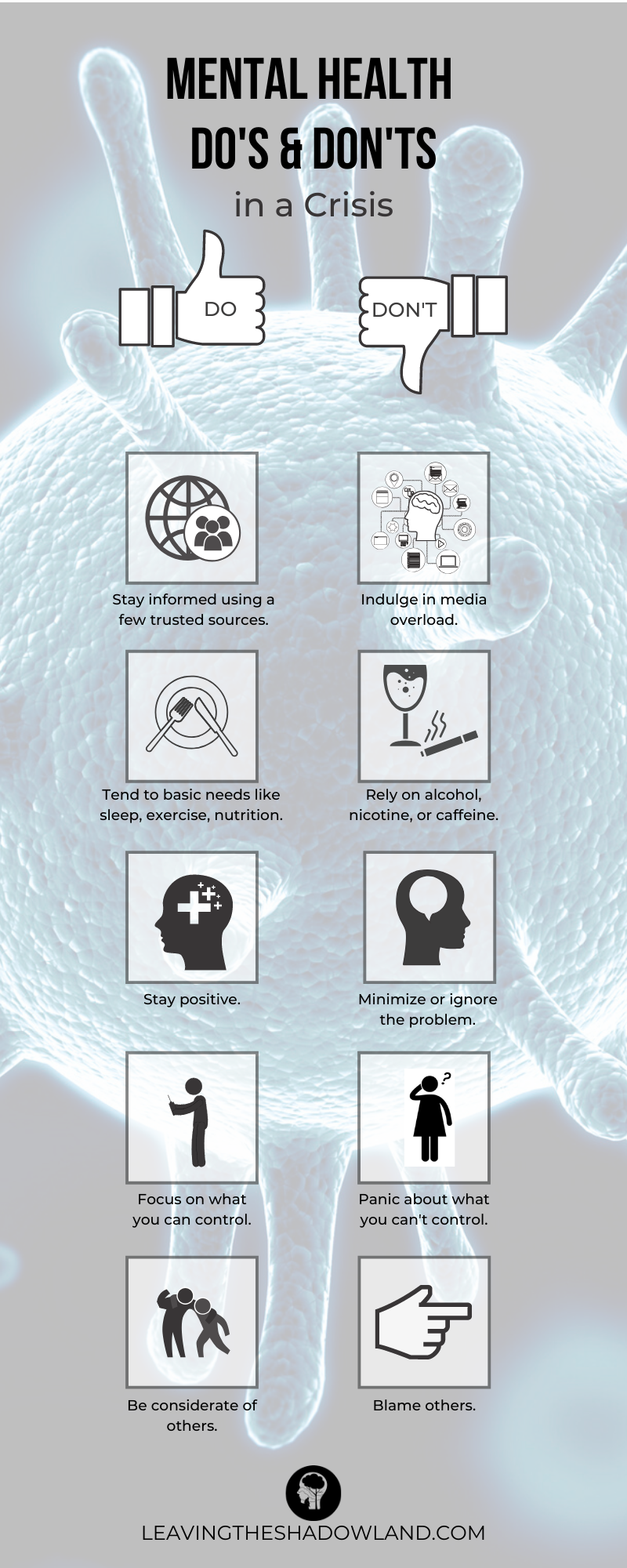
Are you feeling it right now?
A multitude of health care professionals and government leaders around the world are battling the coronavirus/COVID-19 crisis with us and for us. Right now, they are dealing with the immediate issues: coronavirus containment, safety, treatment, and making sure supply chains for our basic needs remain unbroken.
What fewer people are dealing with are the emotional aftershocks that inevitably follow a crisis. And believe me, they will come.
Just as surely as our bodies respond to a physical threat, our minds must grapple with the shock, uncertainty, and anxiety such a crisis evokes.
I’ve spent 25 years studying stress and trauma. And if I were to boil it all down to a single statement, it would be this: the aftershocks can last a lot longer than the crisis. If we are not careful, we will mentally stew in the anxiety of this moment in history for months or even years.
Those who are not prepared or helped through trauma will be at greater risk for stress-induced disorders including:
- post-traumatic stress disorder (ptsd)
- clinical anxiety
- clinical depression
- substance abuse, and others.

Photograph by Yoann Boyer on Unsplash
So, let me ask you again – are you feeling it right now?
Are you feeling jumpy, frustrated, worried, anxious, fearful for the future, helpless, hopeless?
If so, please get the main point of this article loud and clear: while these feelings are normal and natural in the wake of trauma, we can control their impact. You and I can break the link between severe stress and clinical distress and anxiety.
You could even come out of this crisis feeling stronger and more capable of handling adversity than you did going in.
This article is a back to basics look at how to do this.
Take my FREE video course on how to become more resilient in times of stress.
Four Ways to Handle a Crisis
Research shows that, on a spectrum between mental health and mental breakdown, we see four types of people after a crisis:[1]
- those who were broken already;
- those who break and stay broken;
- those who break but mend; and
- those who stay unbroken.
[1] Galatzer-Levy, I. R., Huang, S. H., & Bonanno, G. A. (2018). Trajectories of resilience and dysfunction following potential trauma: A review and statistical evaluation. Clinical Psychology Review, 63, 41-55.
The first group may already be dealing with clinical depression and anxiety. They don’t deal well with stress even under normal circumstances and may collapse completely under the weight of a severe crisis.
The second group may survive and cope with a crisis, but eventually it catches up with them. In the coming weeks or months, they may start exhibiting signs of emotional distress: nightmares, flashbacks, panic attacks, and bouts of sadness and despair.
The goal for you and me is to be in one of the remaining groups:
The third group may struggle with feelings of fear and despair at first, but they wil eventually recover. Those in this group use psychological tools for what’s technically called “post-traumatic growth.” This is our ability to learn and grow from adversity. In terms of emotional health, post-traumatic growth helps us come out of trauma even stronger than we were before.
The fourth group is already strong and remains strong through even the most severe crisis. In psychological terms, these individuals are termed “resilient.”
These inordinately tough individuals show up after every single type of trauma ever studied: natural disasters, terrorism, rape, assault, torture and the holocaust. Researchers like me have been studying them for decades.
The great news for you and me is, we can all learn to grow and become stronger through the stress of life. Resilient people are often born that way, but the rest of us can develop the same thought habits.

Photograph by Tim Mossholder on Unsplash
What Helps – and Does NOT Help – Mental Health in a Crisis
The DO's and DON'Ts of crisis management
DO
DON'T
Feel free to use this Pin-able image:

Mental Health Do's and Don'ts in a Crisis by Pamela Coburn-Litvak
DON’T do media overload.
There is, and will continue to be, a ton of media coverage on the spread of COVID-19 around the world. While it may be tempting to keep in lock step with the latest news story, this may end up feeding your feelings of worry and fear.
I’m not saying, “Don’t watch the media.” I’m saying, “Don’t overdo it.” Be careful in feeding this beast to the point of it controlling your life and disrupting your emotional health.
DO Pay attention to your basic needs.
Here I can only reiterate the wise comments made in a recent CNN story.
Keep in mind that your brain and body are connected. So, in order to take care of your mind, you must take care of the rest of you as well.
This includes basic things like:
- enough sleep,
- good nutrition,
- fresh air and exercise, and
- drinking enough water.
I’ll say more about some of these basics on upcoming posts.
DON’T minimize the problem.
It’s hard to believe that anyone could still be taking the coronavirus lightly. Yet even today, I still see news stories of some minimizing or hand-waving away the gravity of the situation.
As a university professor, I’ve taught pre-med and pre-nursing students the fundamentals of human physiology, including the immune system. So, I can say with authority: don’t minimize this virus. The fact that it is novel to humans means that no one has immunity to it. We can’t be too careful. We also should not minimize the risks to vulnerable populations, including the elderly and those with underlying health issues and compromised immunity.
We also must not under-estimate the impact of this virus on global mental health. I imagine that many mental health groups will have much more to say on this in coming months.
DO stay positive.
In the spring of 2001, Barbara Frederickson and her colleagues began a study of emotions and resilience in a group of college students from the University of Michigan.[2]
When the hijacked planes crashed into U.S. landmarks a few months later, she had an unprecedented opportunity to study a before- vs. after- sample of a population in crisis. She quickly rounded up the students again and asked them the same questions she had before about their emotional state and how they reacted to stress.
I had a personal interest in this study. You see, my husband and I lived with our small daughter in New York City in 2001. My husband’s first job in Manhattan was in the World Financial Center, across the street from the World Trade Center towers. We knew people in those towers.
So I can attest in a personal, significant way to Frederickson’s results. Along with the citizens of NYC and Washington, DC, the students in the study felt a mix of emotions in the months following 9/11. They felt angry, fearful, and sad. Like the rest of America, the vast majority were experiencing symptoms of depression.
But Frederickson noted that “within this dense cloud of anguish, a silver lining shimmered.” The silver lining was a set of positive emotions that, for the most resilient of the college students, mitigated their mental anguish following the attacks.
Resilient citizens in NYC, DC, and across the nation were focusing on the positive. They felt grateful for their loved ones and chose to count their blessings. They also chose, during that horrific time, to stay close to friends and family and find new ways to connect and express their love for one another. In Frederickson’s words, “analyses suggest that positive emotions were critical active ingredients that helped resilient people to thrive despite the emotional blows delivered by the September 11th attacks.”
Let’s do the same now. None of us are not alone in our struggle against coronavirus.
This is a global fight.
Let’s do the best we can to encourage each other by expressing gratitude and love during this difficult time. Research tells us that this can be a mental health imperative.
[2] Fredrickson, B. L., Tugade, M. M., Waugh, C. E., & Larkin, G. R. (2003). What good are positive emotions in crises? A prospective study of resilience and emotions following the terrorist attacks on the United States on September 11th, 2001. Journal of personality and social psychology, 84(2), 365–376. https://doi.org/10.1037//0022-3514.84.2.365
DON’T play the blame game.
I get it. When disaster strikes, we all have a natural urge try to find the root cause. But arguing over who’s to blame takes our eyes off more important goals, like solving the prob of problem solving and supporting those who have been affected.
There’s a well-known psychological concept called “locus of control.” When things go wrong, those with an “outer” locus of control always look for something or someone else to blame. “No, you don’t understand,” they protest, “It’s all THEIR fault. I had nothing to do with it.”
Here’s the problem. Those who constantly want to play the blame game not only rescind personal responsibility over what went wrong; they also relinquish any personal control to fix it. On the other hand, those with an “inner” locus of control recognize and own their own part in any situation. This gives them a whole lot more control over the outcome, including how it affects them emotionally.
This leads us to the healthier alternative to the blame game:
DO focus on what you can control.
During world war II, Reinhold Niebuhr wrote a prayer that was circulated on small cards to soldiers on the battlefield:
God, grant me the serenity to accept the things I cannot change, the courage to change the things I can, and the wisdom to know the difference.
What can you and I change in this coronavirus era?
We can change our behaviors to abide by reasonable measures to stop the virus spread.
We can change our access to resources. This means that, while we make prudent choices in stocking our own pantries and medical supplies, we do not greedily take for ourselves what is needed by others.
We can change our choices to reflect who and what we value most. Some of us have a lot more time on our hands. We can choose to spend this time binge-watching Netflix, or we can spend some extra time with the people we love the most.
When researchers study resilient individuals, one character trait that comes up over and over again is a sense of self-efficiency, a belief that one always has the ability to deal with whatever problems arise.
Believe it or not, this can be true even in the midst of crisis. Elizabeth Scott has developed 4 steps to develop an inner locus of control:
- Realize that you always have a choice. You may not have a choice about stress exposure, but you have choice concerning where you choose to get help and how you choose to cope.
- Make a list of all the options you have in dealing with the crisis. This reminds you that you have options and keep you from feeling trapped.
- Ask for ideas from loved ones. Brainstorm together to come up with even more options.
- Evaluate all courses of action, then choose what seems best to you.

Photograph by Claudio Schwarz Purlzlbaum on Unsplash
Conclusion
The world is facing a scary truth right now: things are probably going to get worse before they get better.
But this also affords us an unprecedented opportunity to step up and help each other through this crisis.
I am holding you in my thoughts and prayers for the coming weeks, and I hope you will do the same for me.
In the meantime, here are a few more things I have going that might be helpful in this crisis.
First, I am planning a few more FREE video courses and webinars that will dive even deeper into protecting our mental health during a crisis. Please stay posted on my Facebook page or this blog for announcements about those.
UPDATE: A FREE video course on how to be resilient during a crisis is now available. You can find out more about it here.
Book a coaching call
I also work with business and healthcare leaders who are dealing with stress and overwhelm. If you are struggling with your stress, consider visiting my business website
If you would like even more tools to strengthen your emotional health during times of stress and crisis, you can buy my book, Leaving the Shadowland of Stress, Anxiety, and Depression, at Amazon:
Learn the best, research-proven ways to overcome depression and anxiety during stressful times!
What others are saying about Leaving the Shadowland:
Dr. Pamela Coburn-Litvak has published research articles on exercise and stress in Neuroscience and Neurobiology of Learning and Behavior. Her latest book, Leaving the Shadowland of Stress, Anxiety, and Depression, was published in 2020.
After receiving a Ph.D. in Neurobiology and Behavior from the State University of New York at Stony Brook, she served as both Assistant Professor of Physiology & Pharmacology and Special Assistant to the Vice President for Research Affairs at Loma Linda University in Loma Linda, California. She then joined the Biology department at Andrews University and developed courses in human physiology as well as the neurobiology of mental illness. She also founded Rock @ Science LLC, a company that specializes in health and science education and web development. She co-developed the brain and body physiology segment of the Stress: Beyond Coping seminar with its creator, Dr. William “Skip” MacCarty, DMin.
Dr. Coburn-Litvak currently lives in California with her husband. Their two daughters are mostly grown and attending school elsewhere.
When she’s not studying or teaching about stress, she enjoys stress-relieving activities like puttering around the garden, taking nature walks with her family, knitting, cooking, and reading.










[…] (This article has also been posted on my website for the general public.) […]